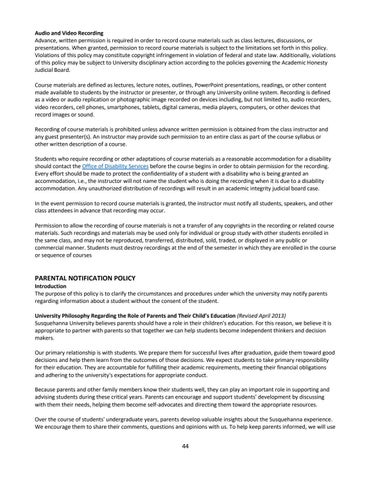Audio and Video Recording Advance, written permission is required in order to record course materials such as class lectures, discussions, or presentations. When granted, permission to record course materials is subject to the limitations set forth in this policy. Violations of this policy may constitute copyright infringement in violation of federal and state law. Additionally, violations of this policy may be subject to University disciplinary action according to the policies governing the Academic Honesty Judicial Board. Course materials are defined as lectures, lecture notes, outlines, PowerPoint presentations, readings, or other content made available to students by the instructor or presenter, or through any University online system. Recording is defined as a video or audio replication or photographic image recorded on devices including, but not limited to, audio recorders, video recorders, cell phones, smartphones, tablets, digital cameras, media players, computers, or other devices that record images or sound. Recording of course materials is prohibited unless advance written permission is obtained from the class instructor and any guest presenter(s). An instructor may provide such permission to an entire class as part of the course syllabus or other written description of a course. Students who require recording or other adaptations of course materials as a reasonable accommodation for a disability should contact the Office of Disability Services before the course begins in order to obtain permission for the recording. Every effort should be made to protect the confidentiality of a student with a disability who is being granted an accommodation, i.e., the instructor will not name the student who is doing the recording when it is due to a disability accommodation. Any unauthorized distribution of recordings will result in an academic integrity judicial board case. In the event permission to record course materials is granted, the instructor must notify all students, speakers, and other class attendees in advance that recording may occur. Permission to allow the recording of course materials is not a transfer of any copyrights in the recording or related course materials. Such recordings and materials may be used only for individual or group study with other students enrolled in the same class, and may not be reproduced, transferred, distributed, sold, traded, or displayed in any public or commercial manner. Students must destroy recordings at the end of the semester in which they are enrolled in the course or sequence of courses
PARENTAL NOTIFICATION POLICY
Introduction The purpose of this policy is to clarify the circumstances and procedures under which the university may notify parents regarding information about a student without the consent of the student. University Philosophy Regarding the Role of Parents and Their Child’s Education (Revised April 2013) Susquehanna University believes parents should have a role in their children's education. For this reason, we believe it is appropriate to partner with parents so that together we can help students become independent thinkers and decision makers. Our primary relationship is with students. We prepare them for successful lives after graduation, guide them toward good decisions and help them learn from the outcomes of those decisions. We expect students to take primary responsibility for their education. They are accountable for fulfilling their academic requirements, meeting their financial obligations and adhering to the university's expectations for appropriate conduct. Because parents and other family members know their students well, they can play an important role in supporting and advising students during these critical years. Parents can encourage and support students' development by discussing with them their needs, helping them become self-advocates and directing them toward the appropriate resources. Over the course of students' undergraduate years, parents develop valuable insights about the Susquehanna experience. We encourage them to share their comments, questions and opinions with us. To help keep parents informed, we will use
44

